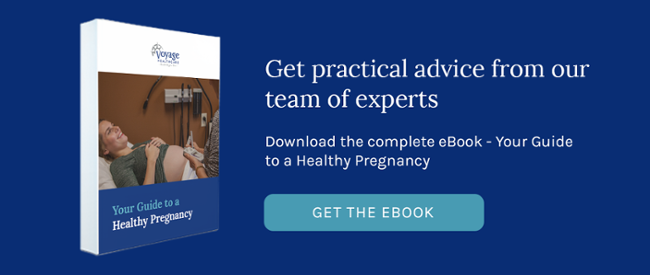Ideally, all women who are pregnant, might be pregnant, or are breastfeeding during the influenza season should receive the inactivated flu vaccine, regardless of their stage of pregnancy. Influenza vaccination is an essential part of prenatal care because pregnant women are at an increased risk of serious illness and even mortality due to influenza.

In addition, maternal vaccination is the most effective strategy to protect newborns because the vaccine is not approved for use in infants younger than 6 months.
The best time to get vaccinated is early in the flu season (October through May), before flu is widespread in the community. It takes about 2 weeks for the body to build up protective antibodies after getting the flu shot. Multiple published studies, as well as years of clinical experience, have supported that the flu vaccine is safe and effective during pregnancy.
Normal Changes that Occur During Pregnancy May Increase the Risk of Complications from the Flu
Changes in the immune system, heart, and lungs during pregnancy make pregnant women and postpartum women more prone to severe illness from flu. Women are more likely to develop pneumonia, be hospitalized, or even die, if they get the flu while they are pregnant.
Getting the flu during pregnancy may also lead to a higher risk of pregnancy complications, such as preterm labor and preterm birth. These risks are even greater in pregnant women who smoke or have asthma. If you're interested in learning how to take care of yourself and your baby while pregnant, check out our healthy pregancy guide.
Is it Safe to Get the Flu Shot During Pregnancy? Yes
Inactivated influenza vaccines are safe for pregnant, postpartum, and breastfeeding women. The U.S. Food and Drug Administration approves all vaccines and they are developed with the highest safety standards. Flu shots have been given to millions of pregnant women at women's clinics over many years with a good safety record. Multiple scientific studies have evaluated and support the safety of the inactivated flu vaccine during pregnancy and have not demonstrated increased risks of either maternal complications or adverse fetal outcomes.
ACOG (American College of Obstetrics and Gynecology) carefully tracks pregnancy-related vaccine safety information through the Department of Health & Human Services. The CDC (Centers for Disease Control) also continues to collect and review scientific data on vaccine safety. Pregnant women should not receive live vaccines and should not receive the nasal spray vaccine or FluMist. If postpartum and breastfeeding, women can receive either the inactivated or the live vaccine.
Can the Flu Vaccine Increase the Risk of Miscarriage?
Multiple studies have shown that women who have gotten flu shots during pregnancy have not had a higher risk for spontaneous abortion (miscarriage). Chromosome abnormalities are actually the most common cause of early miscarriage (in up to 2/3 of cases). However, a recent small study showed that women in early pregnancy who received two consecutive annual flu shots during 2010-2012, did have an increased risk of miscarriage within the first 28 days after receiving the second vaccine. However, there was not an increased risk of pregnancy loss more than 28 days after the vaccination.
 In the same study, when vaccination was given either later in the first trimester, or in the second or third trimester, there was no association with pregnancy loss or any other adverse pregnancy outcomes.
In the same study, when vaccination was given either later in the first trimester, or in the second or third trimester, there was no association with pregnancy loss or any other adverse pregnancy outcomes.
A statement on 9/13/2017, released from ACOG president, Haywood Brown, MD, on the safety of flu vaccine during pregnancy, states that “In evaluating all of the available scientific information, there is insufficient information to support changing the current recommendation which is to offer and encourage routine flu vaccinations during pregnancy regardless of trimester of pregnancy.”
At this time, the Advisory Committee on Immunization Practices (ACIP), ACOG, and the CDC continue to recommend that pregnant women get a flu vaccine during any trimester of their pregnancy because flu poses a danger to pregnant women and a flu vaccine can prevent serious illness, including hospitalization, in pregnant women. A fact sheet with more information on this topic is available.
*Any pregnant woman who has questions about vaccines should talk to her doctor.
Vaccine Side Effects
Most side effects are mild and go away within a day or two, usually a sore arm or possibly a low grade fever. Severe side effects or reactions are rare. Getting the flu vaccine does not cause the flu.
What are Symptoms of Influenza (the Flu)?
Influenza is a virus, but more than just a bad cold. Onset is usually sudden. Flu symptoms may include fever, chills, headache, fatigue, body aches, coughing, sore throat, runny or stuffy nose. It can lead to life threatening complications, such as pneumonia. Influenza is primarily a respiratory infection, and is not the same as the “stomach flu”, which usually refers to a virus causing vomiting, abdominal cramps, and diarrhea.
What Should I do if I Get the Flu During Pregnancy?
Women who are pregnant (or have had a baby in the last 2 weeks) and think they have the flu should contact a health care provider right away. Taking an antiviral medication as soon as possible is recommended—it is most effective when taken within 48 hours of the onset of symptoms. Antiviral medication will not cure the flu, but it can shorten how long it lasts and how severe it is.
Pregnant women who come into close contact with someone who has the flu (i.e. someone you live with, work with, or talk face-to-face with) should also contact a health care provider. Antiviral medication may still be prescribed to reduce the risk of getting the flu.

Resources
- ACOG, It is Safe to Receive a Flu Shot During Pregnancy, 9/13/2017
- Up to Date, Immunizations During pregnancy, 10/2/2017
- www.CDC.gov, search Flu Vaccine Safety and Pregnancy, 10/3/2017





Comments